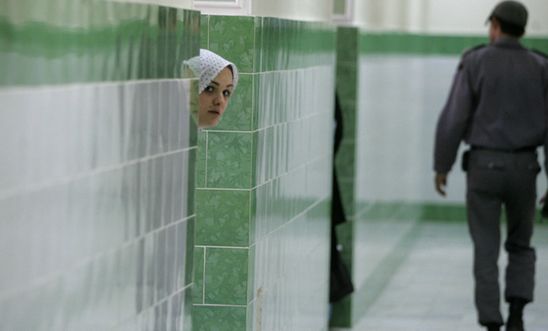
Press releases
Iran: 'vicious' crackdown on human rights activists under Rouhani - new report

Activists given long jail sentences after trials lasting only 45 minutes
‘Offences’ include communicating with EU, UN and human rights organisations
‘The international community, and in particular the EU, must not stay silent over the outrageous treatment of human rights defenders in Iran’ - Philip Luther
The Iranian authorities have waged a “vicious” crackdown on human rights defenders since Hassan Rouhani became president, demonising and imprisoning activists who dare to stand up for people’s rights, Amnesty International said in a new report today.
Over the past four years, Iran’s judicial authorities have lowered the threshold for invoking vague and overly-broad “national security”-related charges and, at the same time, have sharply increased the length of prison sentences given to convicted human rights activists.
In a succession of cases, people have been sentenced to lengthy prison terms, sometimes exceeding a decade, for acts that should not even be considered crimes. These include contact with the EU and the UN, as well as with media outlets, international trade union associations and human rights groups based outside Iran - including Amnesty International. The activists are often labelled “foreign agents” and “traitors” by Iranian state media.
Amnesty’s 94-page report, Caught in a web of repression: Iran’s human rights defenders under attack, provides a comprehensive overview of the crackdown which has targeted activists from key battlegrounds for human rights in Iran. It highlights 45 cases, including anti-death penalty campaigners, women’s rights activists, trade unionists, minority rights activists and human rights lawyers.
One of the most emblematic cases is that of critically-ill human rights activist Arash Sadeghi, who is serving a total of 19 years in prison for “offences” that included communicating with Amnesty as well as sending information to the UN Special Rapporteur on the situation of human rights in Iran, and members of the European Parliament. Despite his critical condition, the authorities have repeatedly blocked his transfer to a hospital outside prison in reprisal for a hunger strike he staged last year in protest at the imprisonment of his wife, Golrokh Ebrahimi Iraee, for writing a fictional story about stoning.
Meanwhile, prominent activist Narges Mohammadi, who led the Centre for Human Rights Defenders in Iran, is serving a 16-year prison sentence also in connection with her human rights work. The criminal case against her was opened in reprisal for a meeting she had with EU’s former foreign policy chief, Catherine Ashton, on International Women’s Day in 2014.
In another case, Raheleh Rahemipour, was sentenced to one year in prison after the UN requested information from the Iranian authorities about the enforced disappearance of her brother and niece during the 1980s. Meanwhile, trade unionists - including Esmail Abdi and Davoud Razavi - have also experienced harassment and imprisonment for being in contact with international organisations, including the International Labour Organisation. In yet another case, Alireza Farshi, a member of Iran’s Azerbaijani Turk minority, was given a 15-year prison sentence for “offences” that included writing a letter to UNESCO to hold an event commemorating International Mother Language Day.
Amnesty is calling on the EU, which announced plans to relaunch a bilateral human rights dialogue with Iran in 2016, to speak out in the strongest terms against the persecution of human rights defenders in the country.
Philip Luther, Amnesty International’s Middle East and North Africa Research and Advocacy Director, said:
“The international community, and in particular the EU, must not stay silent over the outrageous treatment of human rights defenders in Iran.
“Instead of appeasing Iranian officials, the EU should forcefully call for the immediate and unconditional release of all those jailed for their peaceful human rights activism and for an end to the misuse of the justice system to silence activists.
“It is a bitter irony that as the Iranian authorities boast about their increased engagement with the UN and the EU, particularly in the aftermath of the nuclear deal, human rights defenders who have made contact with these same institutions are being treated as criminals.
“Rather than propagating the dangerous myth that human rights defenders pose a threat to national security, the Iranian authorities should focus on addressing the legitimate concerns they raise. These are people who have risked everything to build a more humane and just society - it is appalling that they are so viciously punished for their bravery.”
Grossly unfair 45-minute trials
Human rights activists whose cases are featured in the report were invariably convicted after grossly unfair trials before Revolutionary Courts, where proceedings are often extremely brief. For example, anti-death penalty campaigners Atena Daemi and Omid Alishenas were sentenced to 14 and ten years’ imprisonment, respectively, after a trial in March 2015 which only lasted about 45 minutes. Their sentences were later reduced to seven years on appeal.
Trials of human rights activists generally take place in a climate of fear in which their lawyers face a range of abusive measures. These include attempts by the authorities to arbitrarily restrict them from visiting defendants or communicating with them in private, or delaying their access to court files.
Human rights lawyers who speak out against torture and unfair trials have also faced harassment, disbarment and imprisonment. Prominent human rights lawyer Abdolfattah Soltani has been serving a 13-year sentence since 2011 for his courageous human rights work including with the Centre for Human Rights Defenders.
‘Brave’ campaign
Amnesty recently launched a global campaign ‘Brave’ calling for an end to attacks against those defending human rights worldwide.